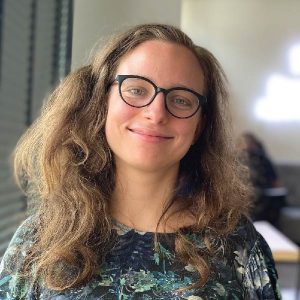"As a doctor, my priority is making sure that people have equal access to healthcare and equitable health outcomes. I want to live in a world where people can live up to their fullest potential, and that’s not being honored because of racism. Oppression hinders potential."
First, I’d like to know a little bit about you as a person. Where did you grow up? Where did you attend undergrad and what was your degree/area of study? [Elzbieta] I was born and raised in Poland. I received my MD from the Poznan University of Medical Sciences, and afterwards I started my residency in internal diseases. Then I decided to go back to university, and this year I received my BSc in mathematics from Adam Mickiewicz University. I decided to pursue an MS in biostatistics because I think it is a great combination of medicine and mathematics, and I will start my program at the School of Public Health fall 2022.

What drew you to public health? [Elzbieta] I was drawn to public health while I was pursuing my undergraduate degree. I didn’t have a concrete plan for what I would do after graduation. I chose to get my BSc in mathematics because I have always had a passion for it, and it was during my studies when I realized that public health was a perfect fit. Public health could multiply my impact to promote health and well-being. In some of the clinical settings I’ve been in, I’ve seen practitioners struggle with data analysis or understanding of research studies. They are often not very accessible, so I plan to utilize my knowledge in biostatistics to help doctors analyze important data, and foster understanding between biostatisticians and physicians.
Are you currently involved in any public health research or professional work? [Elzbieta] I am a Fulbright Foreign Student Program grantee, so I will be moving to the United States this month to pursue my MS in biostatistics. Being part of the Fulbright program has been an amazing experience so far, and I have met so many great people! When I first heard about it, I thought it was out of reach. I was working at a hospital that had two COVID wards, and the workload was very intense. I was losing myself a little bit. But applying for the Fulbright scholarship, and imagining what it would be like to be selected, was like seeing a light at the end of the tunnel. I asked myself, “Who do I want to be?” And this experience is part of the answer. I want to take full advantage of the upcoming two years — to learn and grow by collaborating with people from different disciplines and with different backgrounds, because interdisciplinary cooperation is still something that is not very well-developed in Poland.
Why did you choose to come to the U of M School of Public Health? [Elzbieta] I really like the degree and curriculum at U of M School of Public Health (SPH), and that was really important to me. Plus, the biostatistics program and the school in general has a great reputation. I also wanted to move to a big city without it being too big, because I will be moving with my family. So everything aligned well with SPH.
In what ways is the school a good fit for you? [Elzbieta] I haven’t taken classes yet, but it has already been a great experience. There are so many webinars available that have helped me get ready for the upcoming year. Besides, everyone that I was in touch with has been really helpful. So, I am really looking forward to September!
What is your vision for an antiracist school of public health? [Elzbieta] As a doctor, my priority is making sure that people have equal access to healthcare and equitable health outcomes. I want to live in a world where people can live up to their fullest potential, and that’s not being honored because of racism. Oppression hinders potential, and that is the absolute worst. I think an antiracist school would embody this — it would make sure it was doing everything in its power to help all of its students live up to their fullest potential.

